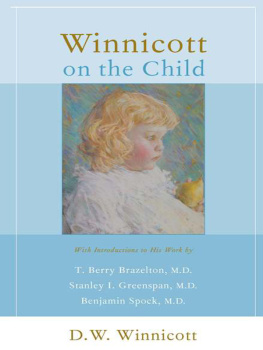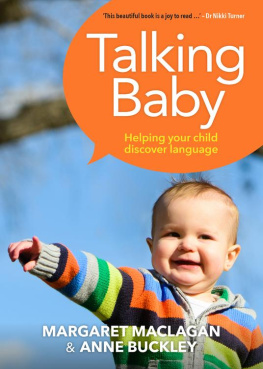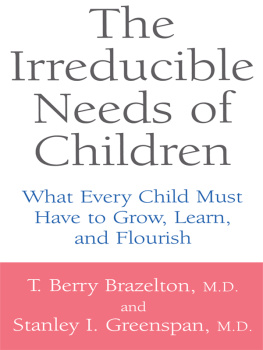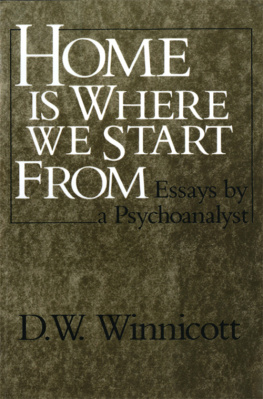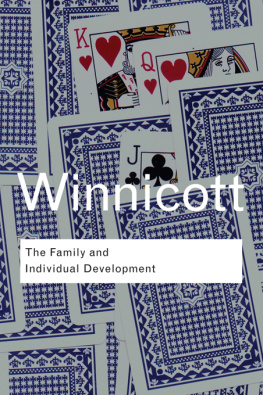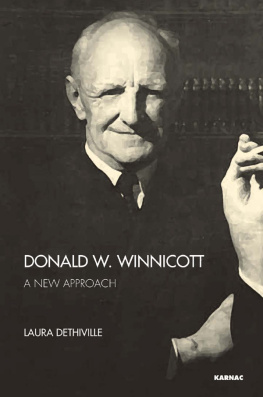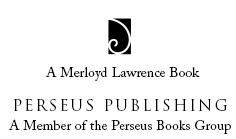Winnicott on the Child
Winnicott on the Child
D. W. WINNICOTT
Introductions by
T. Berry Brazelton, M.D.
Stanley I. Greenspan, M.D.
Benjamin Spock, M.D.
Many of the designations used by manufacturers and sellers to distinguish their products are claimed as trademarks. Where those designations appear in this book and Perseus Publishing was aware of a trademark claim, the designations have been printed in initial capital letters.
Copyright 2002 by The Winnicott Trust
Talking to Parents copyright 1993 by The Winnicott Trust by arrangement with Mark Paterson
Babies and Their Mothers copyright 1987 by The Winnicott Trust by arrangment with Mark Paterson
The Child in the Family Group, Children Learning, The Mothers Contribution to Society, from Home is Where We Start From; Essays by a Psychoanalyst by D.W. Winnicott. Copyright 1986 by the Estate of D.W. Winnicott. Used by permission of W.W. Norton & Company, Inc.
The Development of the Capacity for Concern from Deprivation and Delinquency by D.W. Winnicott. Copyright 1965 by D.W. Winnicott. Used by permission of Routledge.
The Family and Emotional Maturity and Advising Parents from The Family and Individual Development, copyright 1965 by D.W. Winnicott, used by permission of Routledge.
All rights reserved. No part of this publication may be reproduced, stored in a retrieval system, or transmitted, in any form or by any means, electronic, mechanical, photocopying, recording, or otherwise, without the prior written permission of the publisher. Printed in the United States of America.
Cataloging-in-Publication Data is available from the Library of Congress.
ISBN 0-7382-0764-0
ebook ISBN: 9780786750016
Perseus Publishing is a member of the Perseus Books Group.
Find us on the World Wide Web at http://www.perseuspublishing.com
Perseus Publishing books are available at special discounts for bulk purchases in the U.S. by corporations, institutions, and other organizations. For more information, please contact the Special Markets Department at the Perseus Books Group, 11 Cambridge Center, Cambridge, MA 02142, or call (617)2525298, (800) 255-1514, or email
Set in 11-point Adobe Caslon by the Perseus Books Group
First printing, September, 2002
1 2 3 4 5 6 7 8 9 1004 03 02
PART ONE
Babies and Their Mothers
Introduction

by Benjamin Spock, M.D.
I well remember, back in the 1930s when I was starting pediatric practice in New York, my excitement in finding Dr. Winnicotts first book Disorders of Childhood. Here were words of wisdom from a psychoanalyst in London who had begun as a pediatrician and therefore had special insights into the mother-infant relationship.
At the time, I was groping and frustrated. During my pediatric residency I had picked up the idea somewherecertainly not from any of my teachers or colleaguesthat I should have some kind of psychological training in order to practice pediatrics in a way that would satisfy mothers, and also to satisfy myself that my advice was sound. (I was of an overly conscientious and teacherish make-up.) Perhaps this idea grew from the feeling that there must be a pleasanter way to raise children than my tyrannical mothers. Though she loved babies and devoted her life exclusively to her six children, she nevertheless oppressed us all with her stern Victorian morality and left us as adults feeling guilty until proved innocent.
I had written to three professors of pediatrics about psychological training for a pediatrician, but they all replied that there was no such thing. So, following medical tradition, I applied for a psychiatric residency at New York HospitalCornell Medical School (a university department of child development might have been more appropriate), where I spent a year caring mainly for schizophrenic and manic-depressive adults. The only usable thing I learned was that the attending staff members who made our case discussions interesting were those trained in psychoanalysis. So I resolved, as I started pediatric practice, to get that training: a personal analysis, five years of evening seminars, analysis of a patient under supervision. (I might, like Winnicott, have moved on to the practice of psychoanalysis had I succeeded in turning my patient into a happy person. I learned a lot but didnt help my patient.)
Psychoanalytic training gave me a sound theoretical framework but no practical advice for anxious mothers worried about thumb sucking, resistance to weaning and toilet training, or feeding and sleep problems. Still feeling unsure and uneasy, I gave the best advice I could think of and then listened attentively to what mothers reported at the next visitand the next.
After five years of practice I was asked by a publisher to write a book for parents. I said unhesitatingly that I didnt know enough. Five years later came a droll editor from Pocket Books who said the book they wanted didnt have to be very good because, at twenty-five cents a copy, they could sell tens of thousands. That appealed to me both as a do-gooder and as a person afraid to claim too much expertise, and I set to work. The reason these publishers had come to me was not because I was well knownI was utterly unknown except for a small clientele of psychologically minded mothers. The publishers came because their inquiries revealed that I was the only pediatrician with any psychiatric and psychoanalytic training.
Even though Winnicotts books and articles were more concerned with meanings than with the practical answers for mothers, I had a great interest and trust in them. His psychoanalytic training and his analytic work with adults, children, and borderline psychotic patients gave him new, deeper insights into the subtleties of the mother-child relationship and of the stages each was going through. Because of this special expertise, he became one of the major theoreticians of the British psychoanalytic movement, and most of his publications focused on this subject. For me, he helped to bridge the gap between pediatrics and the dynamics of child development.
This book is composed of talks given by Winnicott, not to psychoanalysts, but to pediatricians, general practitioners, nurses, midwives, nursery school teachers and parents, not only in Britain but in international meetings. A few examples show his focus.
In The Ordinary Devoted Mother he expresses his deep faith (which crops up in other talks, too) in the broad capability and correctness of a mothers intuition about what her baby feels and needs, and how this enables the babys trust to form and his or her increasingly complex development to proceed.
The mother acquires this intuition primarily through her extraordinary capability to identify with her baby. And the baby gets carried along by identifying with her. First the baby assumes that he and his mother are one and the same. Then gradually he senses and asserts his autonomy. The early relationship between mother and baby must not be interfered with by anybodyphysicians, nurses, baby nurses in the home, untrained in psychodynamicsfor they may undermine the mothers self-confidence and, secondarily, the babys integrity.

